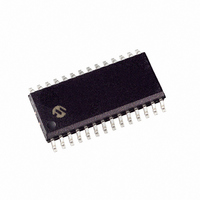DSPIC30F3013-20I/SO Microchip Technology, DSPIC30F3013-20I/SO Datasheet - Page 66

DSPIC30F3013-20I/SO
Manufacturer Part Number
DSPIC30F3013-20I/SO
Description
IC DSPIC MCU/DSP 24K 28SOIC
Manufacturer
Microchip Technology
Series
dsPIC™ 30Fr
Datasheets
1.DSPIC30F2011-20ISO.pdf
(210 pages)
2.DSPIC30F2011-20ISO.pdf
(6 pages)
3.DSPIC30F3012-20ISO.pdf
(14 pages)
4.DSPIC30F3012-20ISO.pdf
(20 pages)
5.DSPIC30F2011-20IP.pdf
(206 pages)
Specifications of DSPIC30F3013-20I/SO
Core Processor
dsPIC
Core Size
16-Bit
Speed
20 MIPS
Connectivity
I²C, SPI, UART/USART
Peripherals
Brown-out Detect/Reset, POR, PWM, WDT
Number Of I /o
20
Program Memory Size
24KB (8K x 24)
Program Memory Type
FLASH
Eeprom Size
1K x 8
Ram Size
2K x 8
Voltage - Supply (vcc/vdd)
2.5 V ~ 5.5 V
Data Converters
A/D 10x12b
Oscillator Type
Internal
Operating Temperature
-40°C ~ 85°C
Package / Case
28-SOIC (7.5mm Width)
Core Frequency
40MHz
Core Supply Voltage
5.5V
Embedded Interface Type
I2C, SPI, UART
No. Of I/o's
20
Flash Memory Size
24KB
Supply Voltage Range
2.5V To 5.5V
Lead Free Status / RoHS Status
Lead free / RoHS Compliant
For Use With
XLT28SO-1 - SOCKET TRANSITION 28SOIC 300MIL
Lead Free Status / RoHS Status
Lead free / RoHS Compliant, Lead free / RoHS Compliant
Other names
DSPIC30F301320ISO
- DSPIC30F2011-20ISO PDF datasheet
- DSPIC30F2011-20ISO PDF datasheet #2
- DSPIC30F3012-20ISO PDF datasheet #3
- DSPIC30F3012-20ISO PDF datasheet #4
- DSPIC30F2011-20IP PDF datasheet #5
- Current page: 66 of 206
- Download datasheet (3Mb)
dsPIC30F2011/2012/3012/3013
8.1
The user-assignable interrupt priority (IP<2:0>) bits for
each individual interrupt source are located in the
LS 3 bits of each nibble within the IPCx register(s). Bit
3 of each nibble is not used and is read as a ‘0’. These
bits define the priority level assigned to a particular
interrupt by the user.
Natural Order Priority is determined by the position of
an interrupt in the vector table, and only affects
interrupt operation when multiple interrupts with the
same user-assigned priority become pending at the
same time.
Table 8-1 lists the interrupt numbers and interrupt
sources
devices and their associated vector numbers.
The ability for the user to assign every interrupt to one
of seven priority levels means that the user can assign
a very high overall priority level to an interrupt with a
low natural order priority. For example, the PLVD
(Low Voltage Detect) can be given a priority of 7. The
INT0 (External Interrupt 0) may be assigned to priority
level 1, thus giving it a very low effective priority.
DS70139F-page 66
Note:
Note 1: The natural order priority scheme has 0
2: The natural order priority number is the
Interrupt Priority
for
The user-assignable priority levels start at
0 as the lowest priority and level 7 as the
highest priority.
as the highest priority and 53 as the
lowest priority.
same as the INT number.
the
dsPIC30F2011/2012/3012/3013
TABLE 8-1:
Highest Natural Order Priority
Lowest Natural Order Priority
Number
*
17-22
26-41
43-53
INT
10
11
12
13
14
15
16
23
24
25
42
Only the dsPIC30F3013 has UART2 and the U2RX,
U2TX interrupts. These locations are reserved for
the dsPIC30F2011/2012/3012.
0
1
2
3
4
5
6
7
8
9
Number
Vector
25-30
34-49
51-61
10
11
12
13
14
15
16
17
18
19
20
21
22
23
24
31
32
33
50
8
9
INTERRUPT VECTOR TABLE
INT0 — External Interrupt 0
IC1 — Input Capture 1
OC1 — Output Compare 1
T1 — Timer 1
IC2 — Input Capture 2
OC2 — Output Compare 2
T2 — Timer 2
T3 — Timer 3
SPI1
U1RX — UART1 Receiver
U1TX — UART1 Transmitter
ADC — ADC Convert Done
NVM — NVM Write Complete
SI2C — I
MI2C — I
Input Change Interrupt
INT1 — External Interrupt 1
Reserved
INT2 — External Interrupt 2
U2RX* — UART2 Receiver
U2TX* — UART2 Transmitter
Reserved
LVD — Low-Voltage Detect
Reserved
© 2008 Microchip Technology Inc.
Interrupt Source
2
2
C™ Slave Interrupt
C Master Interrupt
Related parts for DSPIC30F3013-20I/SO
Image
Part Number
Description
Manufacturer
Datasheet
Request
R

Part Number:
Description:
MODULE DSPIC30F SAMPLE 64QFP
Manufacturer:
Microchip Technology
Datasheet:

Part Number:
Description:
MODULE DSPIC30F SAMPLE 80QFP
Manufacturer:
Microchip Technology
Datasheet:

Part Number:
Description:
MPLAB C Compiler For DsPIC DSCs
Manufacturer:
Microchip Technology
Datasheet:

Part Number:
Description:
DEVICE ATP FOR ICE4000
Manufacturer:
Microchip Technology
Datasheet:

Part Number:
Description:
DEVICE ATP FOR ICE4000
Manufacturer:
Microchip Technology
Datasheet:

Part Number:
Description:
DEVICE ATP FOR ICE4000
Manufacturer:
Microchip Technology
Datasheet:

Part Number:
Description:
MODULE PLUG-IN PIC18F4431
Manufacturer:
Microchip Technology
Datasheet:

Part Number:
Description:
IC, DSC, 16BIT, 12KB 40MHZ, 5.5V, SOIC28
Manufacturer:
Microchip Technology
Datasheet:

Part Number:
Description:
IC, DSC, 16BIT, 24KB 40MHZ, 5.5V, TQFP44
Manufacturer:
Microchip Technology
Datasheet:

Part Number:
Description:
IC, DSC, 16BIT, 48KB, 40MHZ, 5.5V, DIP40
Manufacturer:
Microchip Technology
Datasheet:

Part Number:
Description:
IC, DSC, 16BIT, 48KB 20MHZ, 5.5V, SOIC28
Manufacturer:
Microchip Technology
Datasheet:

Part Number:
Description:
IC, DSC, 16BIT, 66KB, 40MHZ 5.5V TQFP-64
Manufacturer:
Microchip Technology
Datasheet:

Part Number:
Description:
IC, DSC, 16BIT, 12KB, 40MHZ, 5.5V, QFN28
Manufacturer:
Microchip Technology
Datasheet:

Part Number:
Description:
16BIT 30MIPS DSPIC, 30F2010, DIP28
Manufacturer:
Microchip Technology
Datasheet:

Part Number:
Description:
16BIT MCU-DSP 30MHZ, SMD, 30F5011
Manufacturer:
Microchip Technology
Datasheet:










